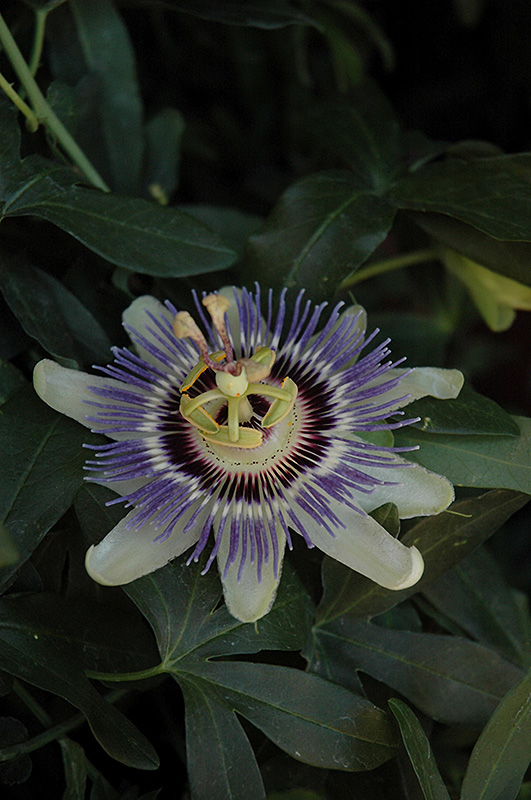Height: 15 feet
Spread: 30 inches
Sunlight:
![]()
![]()
Hardiness Zone: 5
Description:
One of the more spectacular vines for the garden; the large flowers are violet blue with a stunning deep purple ring; wonderful for covering an arbor, trellis or lattice, the flowers are individually beautiful close up
Ornamental Features
Incense Passion Flower features showy fragrant violet star-shaped flowers with blue overtones, creamy white eyes and a deep purple ring at the ends of the branches in mid summer. The flowers are excellent for cutting. It has dark green deciduous foliage. The lobed leaves do not develop any appreciable fall colour.
Landscape Attributes
Incense Passion Flower is a multi-stemmed deciduous woody vine with a twining and trailing habit of growth. Its average texture blends into the landscape, but can be balanced by one or two finer or coarser trees or shrubs for an effective composition.
This is a relatively low maintenance woody vine, and is best cleaned up in early spring before it resumes active growth for the season. It is a good choice for attracting birds, bees and butterflies to your yard. It has no significant negative characteristics.
Incense Passion Flower is recommended for the following landscape applications;
- Accent
- Hedges/Screening
- General Garden Use
Planting & Growing
Incense Passion Flower will grow to be about 15 feet tall at maturity, with a spread of 30 inches. As a climbing vine, it tends to be leggy near the base and should be underplanted with low-growing facer plants. It should be planted near a fence, trellis or other landscape structure where it can be trained to grow upwards on it, or allowed to trail off a retaining wall or slope. It grows at a fast rate, and under ideal conditions can be expected to live for approximately 10 years.
This woody vine does best in full sun to partial shade. It does best in average to evenly moist conditions, but will not tolerate standing water. It is not particular as to soil type or pH. It is somewhat tolerant of urban pollution. Consider applying a thick mulch around the root zone in winter to protect it in exposed locations or colder microclimates. This particular variety is an interspecific hybrid.

